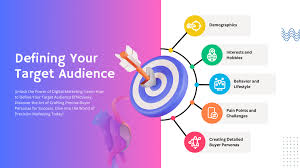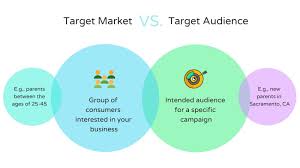Unlock Success: Know Your Target Audience Inside Out
Know Your Target Audience
One of the fundamental principles of successful marketing and communication is understanding your target audience. Whether you are launching a new product, promoting a service, or creating content, knowing who your audience is can make a significant difference in the effectiveness of your efforts.
Identifying your target audience involves more than just basic demographics. It requires a deeper understanding of their needs, preferences, behaviours, and motivations. By knowing your audience inside out, you can tailor your messages and strategies to resonate with them on a personal level.
Why Knowing Your Target Audience Matters
Relevance: When you know who your audience is, you can create content and campaigns that are relevant to their interests and needs. This increases the chances of engaging them and driving desired actions.
Precision: Understanding your target audience allows you to be more precise in your messaging and targeting. You can deliver the right message to the right people at the right time, leading to better results.
Connection: Building a connection with your audience is crucial for establishing trust and loyalty. By knowing their preferences and values, you can create meaningful interactions that resonate with them emotionally.
Tips for Understanding Your Target Audience
To effectively know your target audience, consider the following tips:
- Conduct Market Research: Use surveys, interviews, data analysis, and other research methods to gather insights about your audience’s demographics, preferences, behaviours, and pain points.
- Create Buyer Personas: Develop detailed profiles that represent different segments of your target audience. This helps in visualising who you are targeting and crafting tailored messages for each persona.
- Analyse Feedback: Pay attention to feedback from customers through reviews, comments, social media interactions, etc. This can provide valuable insights into their perceptions and expectations.
- Monitor Trends: Stay updated on industry trends, market changes, and consumer behaviour patterns that may impact how you engage with your target audience.
In Conclusion
In today’s competitive landscape, knowing your target audience is essential for effective communication and marketing strategies. By investing time and effort in understanding who they are and what they want, you can create compelling messages that resonate with them and drive success for your business.
7 Essential Tips for Understanding and Engaging Your Target Audience
- Conduct market research to understand demographics and preferences.
- Create buyer personas to represent different segments of your target audience.
- Analyse data from website analytics and social media insights.
- Engage with your audience through surveys, polls, and feedback forms.
- Monitor trends and changes in consumer behaviour regularly.
- Personalise your communication to cater to specific audience interests.
- Seek feedback from existing customers to improve products or services.
Conduct market research to understand demographics and preferences.
Conducting thorough market research is a crucial step in understanding the demographics and preferences of your target audience. By gathering valuable insights through surveys, interviews, data analysis, and other research methods, you can gain a deeper understanding of who your audience is and what they are looking for. This information allows you to tailor your communication strategies and content to align with the specific needs and interests of your target demographic, increasing the relevance and effectiveness of your marketing efforts.
Create buyer personas to represent different segments of your target audience.
Creating buyer personas is a valuable strategy to represent different segments of your target audience. By developing detailed profiles that embody the characteristics, preferences, and behaviours of specific customer groups, you can gain a deeper understanding of their needs and motivations. Buyer personas help you visualise who your ideal customers are, enabling you to tailor your messaging and strategies to resonate with each segment effectively. This approach allows for more personalised and targeted communication, ultimately leading to stronger connections with your audience and increased engagement with your brand.
Analyse data from website analytics and social media insights.
To gain valuable insights into your target audience, it is crucial to analyse data from website analytics and social media insights. By examining metrics such as website traffic, user demographics, engagement rates, and social media interactions, you can uncover patterns and trends that reveal how your audience interacts with your content online. This data can help you better understand their preferences, behaviours, and interests, allowing you to tailor your communication strategies to effectively engage with them and meet their needs.
Engage with your audience through surveys, polls, and feedback forms.
Engaging with your audience through surveys, polls, and feedback forms is a valuable strategy to gain insights into their preferences, opinions, and needs. By actively seeking feedback from your audience, you can understand their expectations better and tailor your communication strategies to meet their requirements effectively. Surveys, polls, and feedback forms provide a direct line of communication with your target audience, allowing you to gather valuable data that can inform your decision-making process and enhance the overall effectiveness of your marketing efforts.
Monitor trends and changes in consumer behaviour regularly.
Monitoring trends and changes in consumer behaviour regularly is crucial in understanding the evolving preferences and needs of your target audience. By staying informed about shifts in market dynamics, emerging trends, and changing consumer habits, you can adapt your communication strategies to remain relevant and engaging. This proactive approach enables you to anticipate customer expectations, identify new opportunities, and stay ahead of the competition. Keeping a close eye on consumer behaviour empowers you to tailor your messages effectively and deliver value that resonates with your audience, ultimately leading to stronger connections and better outcomes for your business.
Personalise your communication to cater to specific audience interests.
Personalising your communication to cater to specific audience interests is a crucial strategy in effectively engaging with your target audience. By tailoring your messages to resonate with the unique preferences, needs, and behaviours of your audience, you can create a more meaningful connection that drives engagement and loyalty. Understanding what interests your audience allows you to deliver content that is relevant and valuable to them, ultimately leading to a higher level of interaction and response from your target demographic.
Seek feedback from existing customers to improve products or services.
Seeking feedback from existing customers is a valuable strategy to improve products or services. By listening to their opinions, suggestions, and criticisms, businesses can gain valuable insights into what works well and what needs improvement. This feedback not only helps in enhancing the quality of offerings but also fosters stronger relationships with customers by showing that their input is valued. Ultimately, incorporating customer feedback into product development or service enhancements can lead to higher satisfaction levels and increased loyalty, contributing to long-term success for the business.






